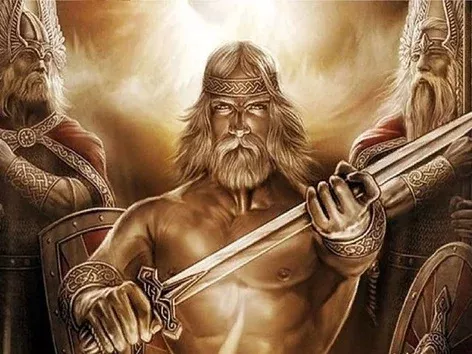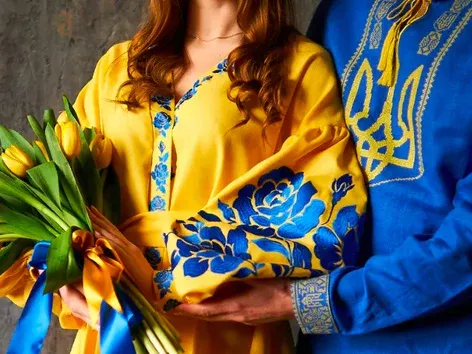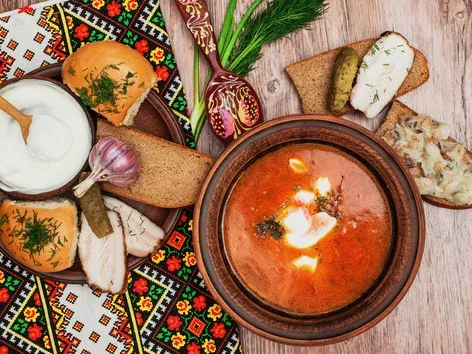
The similarities between Slavic pagan gods and Ancient Greek gods can be seen in some aspects of their functions and attributes. They share similar traits, representing strength and fighting spirit. Learn about the uniqueness of each of these mythologies
All peoples were pagans before the emergence of Christianity and other monotheistic religions. Paganism is a religion that is close to any other religion - belief in a god.
The beliefs of different peoples are very similar, differing only in the names of the gods and minor changes in the legends. This indicates that all peoples share the same roots, but later these beliefs separated and spread to all parts of the world, so their identity is not very pronounced.
Pagan gods and Ukrainian deities overlap and have their own prototype. Here's what connects the Ukrainian and Greek gods.
Zeus and Perun
In mythology, Zeus and Perun controlled lightning and thunder, but they also had some minor differences.
Perun was one of the most revered gods of the ancient Slavs, often mentioned in songs, legends, and myths. He symbolized power and strength. He was depicted as an elderly man with an impressive beard, dressed in chainmail, holding a weapon.
Perun was subject to the heavenly elements, such as thunder and lightning, and a violent thunderstorm could often be seen behind him. It was believed that he assisted in battles, protecting them from enemies.
Zeus is the supreme god of Ancient Greece, sitting on Mount Olympus. He is the ruler of the heavenly elements, and punishes enemies with thunder and lightning. He patronized the entire state and people. Zeus was often depicted as a powerful man of age, with noble features and gray hair and beard. He easily controlled the elements of nature and the lives of people.
Zeus and Perun are similar in their characteristics and functions, as they are descended from the supreme pre-Indo-European gods, but they were part of different cultures and mythological systems, which is reflected in their differences.
It is believed that Perun is most associated with military affairs and protects against enemies.
Visit Ukraine on social media: Telegram | YouTube | Instagram | Facebook | Twitter | TikTok
Aphrodite and Lada
Aphrodite and Lada are the most revered female deities among ancient people. They were the goddesses of love and fertility.
Lada, the goddess of love and beauty, was revered by the ancient Slavs as the patroness of marriage. She was identified with the power of spring fertility.
Songs were sung in honor of this goddess in spring and summer. The rite of the "spring spell" was held at the very beginning of March. During this ceremony, Lada was asked to help speed up the arrival of spring. During all divination, this goddess was considered the patroness of girls. She personified not only happy relationships but also unrequited, unhappy love.
People used to say about a person who married without love, "He did not marry Lada!" to avoid such a disaster, the newlyweds tried to appease the goddess by offering her flowers, live birds, honey, and berries.
Striking in its splendor, the majestic temple of Lada was located in Kyiv, where a statue of a beautiful woman stood on a hill, her head crowned with a pink wreath. Her golden locks of hair were decorated with pearls, and her dress was embroidered with skillful sewing and precious stones. In her hands, she held her son, a winged infant, the god of Love, by the hand.
The Greek Aphrodite and Roman Venus are considered analogous to Lada.
Aphrodite, the goddess of love, beauty, and fertility in the mythology of the ancient Greeks, was one of the twelve greatest gods of Olympus. She was considered the goddess of fertility, childbirth, marriage, eternal spring, and life. All humans and gods, except Athena, Artemis, and Hestia, fell under her power of love. The goddess was ruthless to anyone who did not recognize the power of love. She was the wife of Hephaestus and later Ares.
Dionysus and Yarylo
In Ancient Greece, Dionysus, and among the Slavs, Yarylo, symbolized the masculine principle, love of life and fertility.
Yarylo was the main god of love in Ukraine. He was a symbol of love, passion, and fertility. He was represented as a young, red-haired rider on a snow-white horse.
Every year, Ukraine celebrates the holiday of spring and rebirth. People chose the most beautiful girl as a bride for Yarylo and then tied her to a tree and danced around her. Then this beauty queen was given gifts. It was believed that various love divination, spells, and decoction became especially powerful during the festive week of Yarylo.
Dionysus, the god of Greece, was the god of Yarylo. He is not only the god of gluttony, drunkenness, and love of pleasures but also of abundance, fertility, and prosperity. The external image of these two gods is similar: Dionysus is decorated with branches of grapes from which wine is made. Yarylo's has hop leaves, the main ingredient in beer. The gods love noisy celebrations, which often turn into orgies. They are two lovers of carnal pleasures, gluttony, and unrestrained merriment.
You may be interested in:
Visit Ukraine Donation - make a good deed and an important contribution to the Victory of Ukraine;
Visit Ukraine Tours - the largest online database of tours to Ukraine for every taste;
Visit Ukraine Merch - choose patriotic clothing and accessories with worldwide delivery;
Visit Ukraine News - get the latest news and updates in our Telegram channel;
Cooperation - cooperation and advertising integrations with Visit Ukraine and Visit World projects.
Recommended articles
1 min
Popular
Vyshyvanka Day: interesting traditions, facts and significance for the Ukrainian people
The main attribute of the Vyshyvanka Day is an embroidered shirt, which is considered a symbol of identification of the Ukrainian people. We tell you about the history of the holiday, the meaning of embroidery, and when Ukrainians started wearing embroidery for the first time
18 May. 2023
More details1 min
Popular
Ukrainian cuisine: traditional foods and dishes that foreigners should try
Traditional Ukrainian cuisine is among the most delicious in the world. Learn more about the favorite dishes of the Ukrainian people and what you should definitely try while in Ukraine
23 May. 2023
More details1 min
Popular
Crossing the border with children: updated rules 2023
Traveling abroad with children remains relevant today. Learn more about the rules of border crossing and whether a child of 16 can travel abroad without parents
25 May. 2023
More details2 min
Events
The international holiday - European Neighborhood Day - is considered to be a symbol of tolerant attitude towards those who live next door to you. Find out why this holiday has become a trigger for Ukrainians
26 May. 2023
More details

